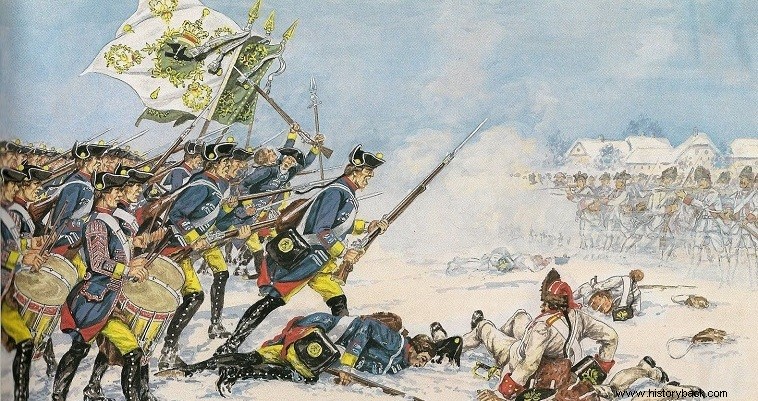
The War of the Austrian Succession was one of the greatest military conflicts, perhaps the first global conflict in history. It also includes the Austro-Prussian conflicts that took place in the Silesian region and were known in history as the First and Second Silesian Wars.
The first of these conflicts broke out in December 1740, when the Prussian Army, led by King Frederick II the Great himself, invaded the then Austrian province of Silesia. Austria at that time was in a miserable situation, on all levels, a fact that its opponents were quick to exploit for their own benefit.
Under the pretext of not recognizing the right of succession to the imperial throne of Maria Theresa and her husband Charles, France, Spain and Bavaria allied against Austria. France intended to annihilate Austrian influence in the German states and dominate both banks of the Rhine. Spain sought to wrest Austrian-held Italian territories, and Bavaria sought to promote its own candidate for the imperial throne.
Taking advantage of the confusion and the multitude of threats surrounding Austria, the king of the small Prussian state, Frederick II, decided to attack Austria as well in order to wrest the rich province of Silesia from her.
Prussian invasion and response
The Prussian attack caught the Austrians completely unprepared. The result was that, within a short period of time, Silesia was almost completely occupied. Only various forts and the light Austrian troops, harassing the Prussian advance, were the last signs of the Austrian presence in the region. As- as the Council of Vienna attempted to raise troops to retake lost Silesia.
In April 1741 the Austrians in turn invaded their former province. After lifting the siege of various fortresses, they regained control of a large part of Silesia. As if this were not enough, they managed to maneuver with such skill that they found themselves behind the Prussian troops commanded by Frederick himself.
Having no other choice, the latter was forced to accept the battle with an inverted front, which his opponents offered him. The Prussians were trapped between two rivers and the village of Molwich, which was held by the Austrians. The main supply road passed through the village, through which Frederick's army communicated with the Prussian lands.
Frederikos absent... winner
On April 10, 1741 the Prussians attacked. The Prussian army numbered 21-23,000 men. The Austrians, under Marshal Neiperg, did not exceed 16,000 men. The Prussian Army was deployed for battle with the infantry, in two lines, in the center and the cavalry on the wings. The infantry had lined up in an enclosed rectangular parallelogram formation.
The Prussian cavalry was numerically and qualitatively inferior to the opponent. The battle began in the early afternoon hours. The Austrian cavalry on the left wing, under the gallant General Remer, immediately charged against their counterparts on the Prussian right and put them to disorderly flight . In vain did Frederick try to stop the shameful flight of his cavalry. In his attempt to do this, he almost met death himself.
Despite its superiority over the Prussian cavalry, however, the Austrian cavalry was literally disintegrated in its attempt to break through the enemy infantry lines. Its leader himself fell during these desperate attacks. Meanwhile Frederick had, after toil and suffering, been persuaded to leave the field of battle. The experienced Marshal von Schwerin now remained at the head of the army.
The marshal, having absolute confidence in the high level of training and fighting value of his infantry, did not hesitate to order the advance of his vast, living, parallelogram of infantry against the enemy's center, ignoring the threat posed by the presence of the Austrian cavalry on his right flank.
Indeed, the Prussian infantry moved in absolute order, repulsed any attempt by the Austrian cavalry to disrupt their movement, and attacked the Austrian infantry in pieces. The Austrian Army retreated in relative order leaving behind 4,500 of its men and 7 cannons. The victorious Prussians had also suffered heavy losses – 4,600 men.
